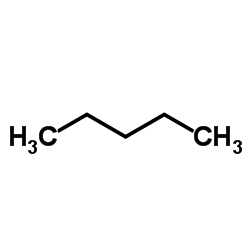Pentane

Pentane structure
|
Common Name | Pentane | ||
|---|---|---|---|---|
| CAS Number | 109-66-0 | Molecular Weight | 72.149 | |
| Density | 0.6±0.1 g/cm3 | Boiling Point | 35.2±3.0 °C at 760 mmHg | |
| Molecular Formula | C5H12 | Melting Point | -130ºC | |
| MSDS | Chinese USA | Flash Point | -49.4±0.0 °C | |
| Symbol |




GHS02, GHS07, GHS08, GHS09 |
Signal Word | Danger | |
|
Viruses infecting marine picoplancton encode functional potassium ion channels.
Virology 466-467 , 103-11, (2014) Phycodnaviruses are dsDNA viruses, which infect algae. Their large genomes encode many gene products, like small K(+) channels, with homologs in prokaryotes and eukaryotes. Screening for K(+) channels revealed their abundance in viruses from fresh-water habit... |
|
|
Lung deposition and cellular uptake behavior of pathogen-mimicking nanovaccines in the first 48 hours.
Adv. Healthc. Mater. 3(7) , 1071-7, (2014) Pulmonary immunization poses the unique challenge of balancing vaccine efficacy with minimizing inflammation in the respiratory tract. While previous studies have shown that mice immunized intranasally with F1-V-loaded polyanhydride nanoparticles are protecte... |
|
|
Catalytic and charge transfer properties of transition metal dichalcogenides arising from electrochemical pretreatment.
ACS Nano 9 , 5164-79, (2015) Layered transition metal dichalcogenides (TMDs) have been the center of attention in the scientific community due to their properties that can be tapped on for applications in electrochemistry and hydrogen evolution reaction (HER) catalysis. We report on the ... |
|
|
Safety and biocompatibility of carbohydrate-functionalized polyanhydride nanoparticles.
AAPS J. 17(1) , 256-67, (2015) Carbohydrate functionalization of nanoparticles allows for targeting of C-type lectin receptors. This family of pattern recognition receptors expressed on innate immune cells, such as macrophages and dendritic cells, can be used to modulate immune responses. ... |
|
|
Reductive dechlorination of carbon tetrachloride using buffered alkaline ascorbic acid.
Chemosphere 136 , 27-31, (2015) Alkaline ascorbic acid (AA) was recently discovered as a novel in-situ chemical reduction (ISCR) reagent for remediating chlorinated solvents in the subsurface. For this ISCR process, the maintenance of an alkaline pH is essential. This study investigated the... |
|
|
Polyanhydride Nanoparticle Delivery Platform Dramatically Enhances Killing of Filarial Worms.
PLoS Negl. Trop. Dis. 9 , e0004173, (2015) Filarial diseases represent a significant social and economic burden to over 120 million people worldwide and are caused by endoparasites that require the presence of symbiotic bacteria of the genus Wolbachia for fertility and viability of the host parasite. ... |
|
|
Effect of nanovaccine chemistry on humoral immune response kinetics and maturation.
Nanoscale 6(22) , 13770-8, (2014) Acute respiratory infections represent a significant portion of global morbidity and mortality annually. There is a critical need for efficacious vaccines against respiratory pathogens. To vaccinate against respiratory disease, pulmonary delivery is an attrac... |
|
|
Survival and differentiation of adenovirus-generated induced pluripotent stem cells transplanted into the rat striatum.
Cell. Transplant. 23(11) , 1407-23, (2014) Induced pluripotent stem cells (iPSCs) offer certain advantages over embryonic stem cells in cell replacement therapy for a variety of neurological disorders. However, reliable procedures, whereby transplanted iPSCs can survive and differentiate into function... |
|
|
The LIM homeodomain factor Lhx2 is required for hypothalamic tanycyte specification and differentiation.
J. Neurosci. 34(50) , 16809-20, (2014) Hypothalamic tanycytes, a radial glial-like ependymal cell population that expresses numerous genes selectively enriched in embryonic hypothalamic progenitors and adult neural stem cells, have recently been observed to serve as a source of adult-born neurons ... |
|
|
A highly selective biosynthetic pathway to non-natural C50 carotenoids assembled from moderately selective enzymes.
Nat. Commun. 6 , 7534, (2015) Synthetic biology aspires to construct natural and non-natural pathways to useful compounds. However, pathways that rely on multiple promiscuous enzymes may branch, which might preclude selective production of the target compound. Here, we describe the assemb... |